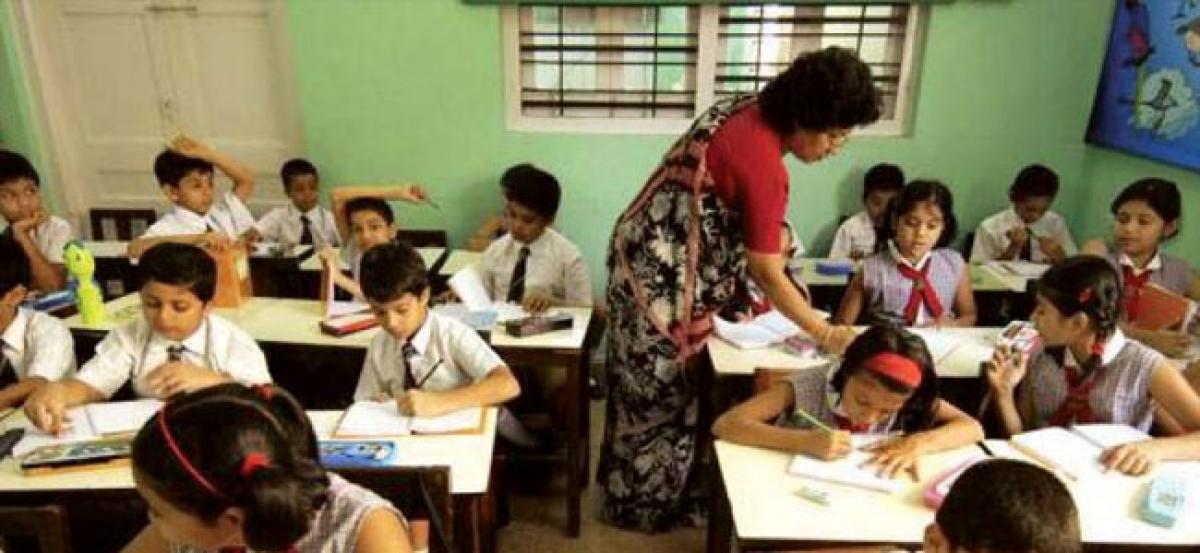Live
- Boxing Day Test Weather Forecast: Rain Delays Expected on Day 3 and Day 4 in Melbourne
- Baby John Twitter Reviews: Varun Dhawan Impresses, But Fans Feel the Remake Lacks Theri's Charm
- Pakistan Air Strikes Kill 46 in Afghanistan, Taliban Confirms Amid Rising Tensions
- ACB Launches Investigation into Formula E Races Held in Hyderabad Last Year
- Mega Job Mela in Madhapur on December 28: Explore Employment Opportunities in Hyderabad
- New Mizoram Guv likely to take charge next week
- Barroz 3D Movie Review: A Visual Treat for Mohanlal Fans, Mixed for Others
- Donate Blood, Save Lives: BJP Hosts Mega Blood Donation Camp in Aiza
- Azerbaijani Airliner Crashes Near Aktau, Kazakhstan: 32 Survive, Over 30 Feared Dead
- Union Minister Bandi Sanjay Kumar to Visit Jogulamba Gadwal District on December 27, 2024
Just In

Safety and security of students, protecting them from sexual abuse, guarding the rights of children who perform poorly in academics are among the key features of a new Bill passed by the Tamil Nadu Assembly
The Tamil Nadu Private Schools (Regulation) Bill, 2018, was adopted for ensuring quality education and collection of fair fee.
Chennai: Safety and security of students, protecting them from sexual abuse, guarding the rights of children who perform poorly in academics are among the key features of a new Bill passed by the Tamil Nadu Assembly.
Aimed at regulating private schools, the bill has been welcomed by parents and educationists alike. Wilful non-compliance of such mandatory features could attract imprisonment of up to a year or a fine that could go up to Rs five lakh or both.
The Tamil Nadu Private Schools (Regulation) Bill, 2018 was adopted by the assembly on July 5. It is aimed at ensuring aspects including assurance of quality education, collection of fair fee and proper conduct of examinations.
"No private school shall prevent any pupil on its rolls from appearing for any board examinations on account of poor academic performance," says Section 22 (3) of the Act. Non-compliance may invite one-year imprisonment or Rs five lakh fine or both.
"It is significant as some schools in the state have the practise of not allowing poor performers to sit for board examinations," said a parent, P Ravikumar.
All schools now have the mandate to ensure the "safety and security of students including protection from mental harassment or physical injury or sexual abuse," as per sections 20 (1) and (2). "These provisions are timely and laudable," said another parent S Arun, listing out several allegations of sexual abuse by teachers.
Given accidents like the recent death of a nine-year-old girl after she fell from the fourth floor of her school in Chennai and some teachers allegedly resorting to corporal punishment, the new provisions will help prevent them, he said.
General Secretary, State Platform for Common School System-Tamil Nadu, P B Prince Gajendra Babu, welcoming the law said a robust mechanism should, however, be put in place to implement the Act.
"There should be a transparent mechanism in every educational district to register complaints of students and parents. Measures should be in place to ensure that nobody, including teachers, are victimised and justice rendered to all."
He said the focus on ending unhealthy competition among private schools and stress on fair fee collection are praiseworthy.
According to section 26, which reaffirms a 2009 Tamil Nadu Act, "no school shall collect any charge...except the fee fixed by the Fee Determination Committee."
Against the background of incidents like a student's recent death here after he was allegedly punished by making him to do "duck walk" by a physical trainer, the new law will help avert such incidents, the noted education activist said.
President, TN Private Schools Association, R Visalakshi too welcomed the law saying it will provide an impetus to schools in their endeavour to provide quality education.
"It will be helpful for promoters of new schools as well," she said. Referring to sub-clause 7 of Section 8 that "no child shall be admitted in any school which has not been recognised," she said a list of recognised schools should be publicised by the government.
If a child was admitted to an unrecognised school, it attracts a punishment of up to one year or a fine up to Rs five lakh or both (for the unrecognised institution).
Importance for a "judicious mix of curricular, co-curricular and extra-curricular activities," and learning outcomes are among the other notable features of the new law.
The school Bill was adopted after an expert committee came up with a draft legislation which considered all relevant Acts, rules, codes and government orders in this regard. The law applies to all private -both aided and unaided- and will come into force on a date the government will notify.

© 2024 Hyderabad Media House Limited/The Hans India. All rights reserved. Powered by hocalwire.com







